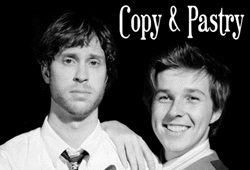
Despite a proliferation of original web series sprouting up on the Internet as of late, it is still somewhat of a rarity to find one produced by truly independent industry outsiders that is also well-written, well-acted, polished and entertaining. Copy & Pastry, created by two Berkeley School of Digital Filmmaking graduates, is the epitome of those qualities and demonstrates what can happen when exceptional talent is combined with the entrepreneur nature of the World Wide Web.
The series revolves around two roommates attempting to break into the pastry business and the numerous obstacles and screwball comedy situations they find themselves in. Scott McCabe and Tory Stanton, who not only created and wrote the show but star in it as well, have a likeable charm about them and genuine chemistry when they interact. In many ways they were tailor made for each other, a sort of Abbott and Costello, Martin and Lewis and even Laurel and Hardy for the Internet Age.
Copy & Pastry harkens back to those early comedy days in another sense – many scenes are filled with slapstick and the physical comedy abilities of McCabe and Stanton are just as impressive as their writing and acting skills. From McCabe’s attempts to pick a blood-donating Stanton up off the floor to the duo making their way to the front of a bookstore lecture, the web series is filled with such old-school sequences.
Like any quality sitcom, Copy & Pastry is also populated with an assortment of oddball supporting characters. There’s Patty Plumbopple (Rana Weber), the board of health supervisor whose office is decorated with nude male drawings made by her son; an ill-tempered, foul-mouthed priest who belittles the Copy & Pastry caterers for selling baked goods on church property; and Vick (Matt Gunnison), a fake health inspector who gets wasted on marijuana-laced brownies.
The laughs don’t stop at the conclusion of each installment, however, as the final sequences feature acapella-style singing and fictional commercials. As the credits roll, Scott McCabe and Tory Stanton are seen in a recording studio performing versions of such songs as the Beach Boys’ “Wouldn’t It Be Nice,” rewritten to reflect the culinary aspect of the series. “Mister Sandman” thus becomes “Mister Tart Man,” and “Pour Some Sugar on Me” transforms into “Extra Sugar for Free.”
Like everything else about Copy & Pastry, the vocal performances again prove that McCabe and Stanton are capable of “doing it all” in what often feels like a two-man vaudeville show.
The commercials tacked on at the end, meanwhile, are humorous stand-alones that work just as well. While many remain true to the web series’ theme – such as Pud’s Pizza and Mrs. Munchies – others have no connection to the food industry. The end of the third episode, for instance, features a hilarious send-up of Apple’s iPhone 3G, called ePhone 3H.
“Want to know what your new bride is doing on her lunch break? There’s an app for that,” the announcer proclaims. “Want to know if the child’s yours or not? You better believe there’s an app for that.”
Although many web series and independent films often utilize friends and colleagues as actors, Scott McCabe and Tory Stanton went the professional route of seeking talent within the Berkley theater and comedy scene, going so far as to even use a casting director. The two also split the filming of the episodes into phases in order to make their endeavor stronger, funnier and better.
“We wrote and shot episodes one-to-three first, and then cut them together to see which story lines played best,” McCabe told CineSource Magazine in March 2010. “Then we took a month off to write and pre-produce the last four episodes. This method was validated by the difference in quality, both narratively and technically, of the back half of the season.”
Such deviation from the traditional model of filmmaking adds to the appealing quality of Copy & Pastry. Although McCabe and Stanton could be considered mavericks to the medium, they still adhered to the basics of web series creation in regards to the finished product. The writing, for instance, is as tight and funny as anything on television – let alone the Internet – and the under-ten-minute episodes both advance the overall storyline as well as stand on their own merit. The behind-the-camera efforts of director Joel Pincosy and cinematographer Justin Potter, meanwhile, add to the professional tone and quality of the production.
Scott McCabe and Tory Stanton may be new to the world of the web series medium, but they have proven that they have an innate ability to follow the basics and add new twists to the production process, in the end making Copy & Pastry one tasty treat of comedic entertainment.
Anthony Letizia

